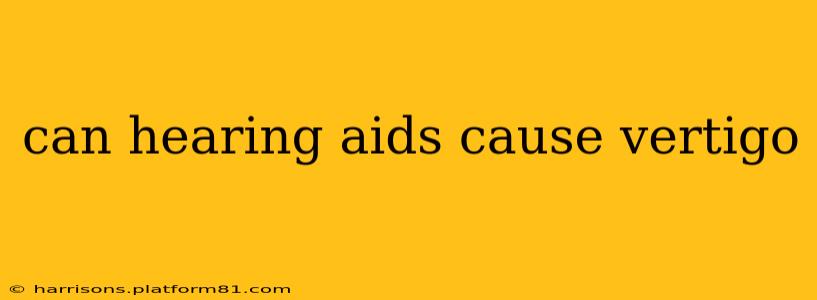Can Hearing Aids Cause Vertigo? Understanding the Connection
Vertigo, that unsettling sensation of spinning or dizziness, can be a debilitating experience. While hearing loss itself isn't directly linked to vertigo, the use of hearing aids sometimes gets associated with it. This often stems from misunderstandings and the complex interplay of factors affecting balance and hearing. This article will explore the potential connection between hearing aids and vertigo, addressing common concerns and clarifying the situation.
What Causes Vertigo?
Before examining the hearing aid connection, let's understand vertigo's root causes. Vertigo arises from problems within the inner ear, brain, or vestibular system – the sensory system responsible for balance. Conditions like benign paroxysmal positional vertigo (BPPV), Meniere's disease, labyrinthitis, and vestibular neuritis can all trigger vertigo. Even certain medications and head injuries can contribute.
Can Hearing Aids Directly Cause Vertigo?
The short answer is: generally, no. Hearing aids themselves don't directly cause vertigo. They amplify sound, improving hearing, but they don't interfere with the inner ear's balance mechanisms. However, several indirect factors related to hearing aid use might contribute to the sensation of dizziness or imbalance in some individuals:
Are There Side Effects From Hearing Aids That Might Feel Like Vertigo?
While not true vertigo, some hearing aid users experience side effects that feel like vertigo. These include:
- Improper Fit: Poorly fitted hearing aids can cause pressure or discomfort in the ear canal, potentially leading to feelings of dizziness or imbalance. This is more likely with ill-fitting custom molds or overly tight ear hooks.
- Sudden Changes in Auditory Input: The brain needs time to adjust to amplified sounds. When new hearing aid users suddenly experience clearer, louder sounds, it can initially cause disorientation, which some may describe as a spinning sensation. This usually subsides as the brain adapts.
- Excessive Amplification: Over-amplification can lead to auditory overload, causing nausea, fatigue, and a feeling of being unsteady. A proper hearing test and professional fitting are crucial to prevent this.
- Occlusion Effect: This occurs when the hearing aid blocks the ear canal, creating a feeling of fullness or pressure, sometimes perceived as dizziness. This is more common with earplugs or certain types of hearing aids.
What if I Experience Dizziness After Getting Hearing Aids?
If you experience dizziness after getting hearing aids, don't panic. The first step is to contact your audiologist. They can assess the fit, check the settings, and rule out any issues with the device. If the dizziness persists, they may refer you to an ENT specialist (otolaryngologist) or neurologist to rule out underlying medical conditions.
How Can I Minimize the Risk of Dizziness with Hearing Aids?
- Gradual Adjustment: Allow your brain time to adjust to amplified sounds. Start with shorter wearing times and gradually increase the duration.
- Proper Fitting: Ensure your hearing aids are properly fitted by a qualified audiologist.
- Regular Check-ups: Schedule regular appointments with your audiologist for adjustments and cleaning.
- Communicate Symptoms: Immediately report any dizziness or discomfort to your audiologist.
In Conclusion:
While hearing aids themselves don't cause vertigo, certain factors related to their use might lead to symptoms that feel similar. Proper fitting, gradual adjustment, and regular communication with your audiologist are vital to minimize any potential discomfort and ensure a safe and effective hearing aid experience. If you're experiencing dizziness, consult a healthcare professional to identify the cause and receive appropriate treatment.
